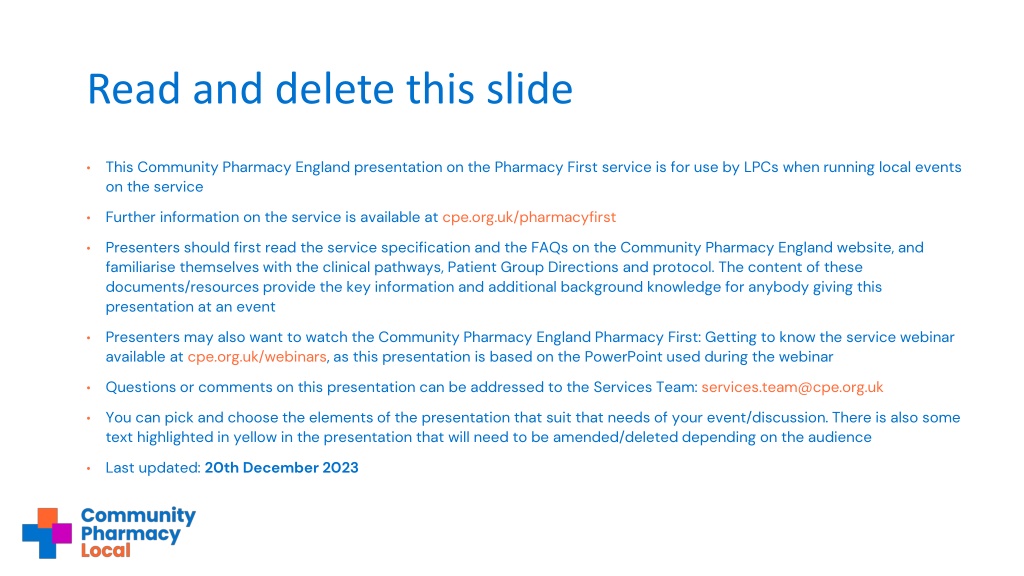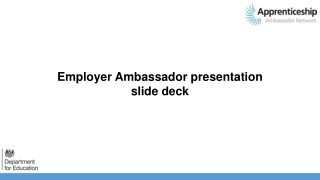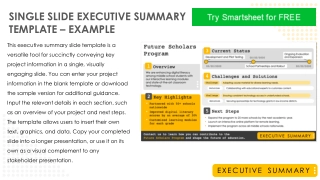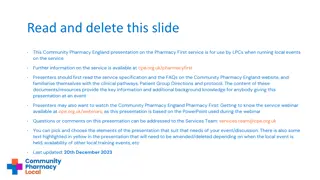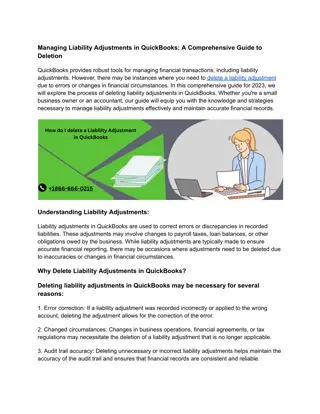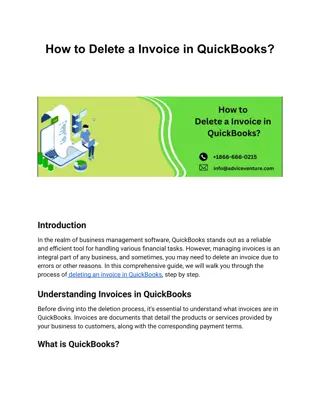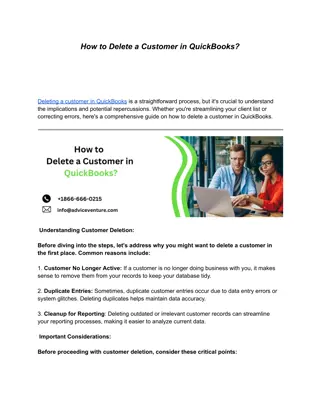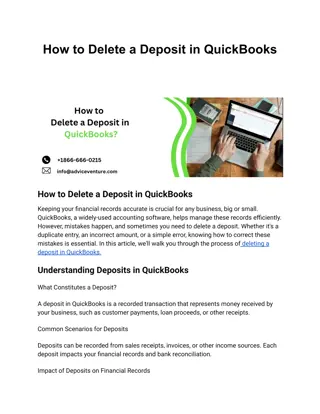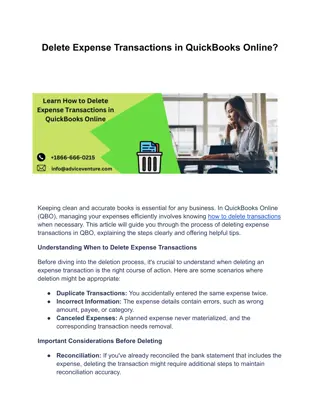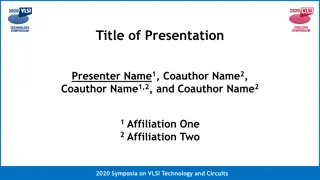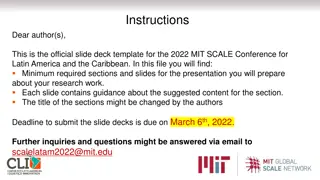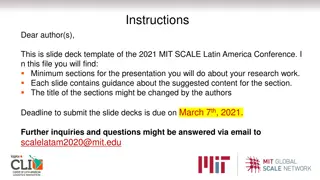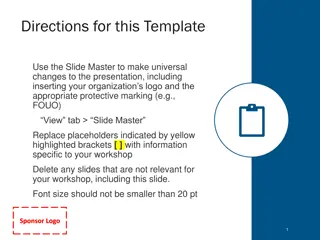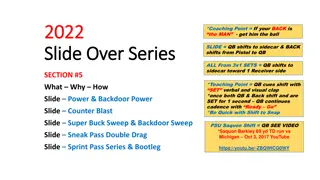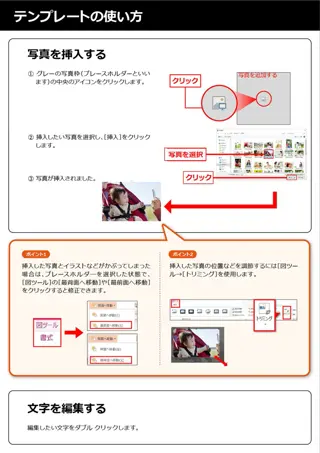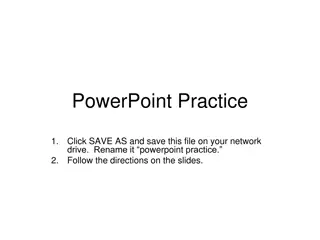Read and delete this slide
Community Pharmacy England has introduced the Pharmacy First service, aimed at providing urgent supply of repeat medications, referrals for minor illness consultations, and clinical pathway consultations. The service has strategic context, service requirements, and learning and development aspects, with a start date of January 31, 2024. The presentation covers key information for presenters to deliver effectively at local events, highlighting the optional New Advanced service and the commitment to treat seven conditions. Providers should refer to the official documentation for accurate information.
Download Presentation

Please find below an Image/Link to download the presentation.
The content on the website is provided AS IS for your information and personal use only. It may not be sold, licensed, or shared on other websites without obtaining consent from the author.If you encounter any issues during the download, it is possible that the publisher has removed the file from their server.
You are allowed to download the files provided on this website for personal or commercial use, subject to the condition that they are used lawfully. All files are the property of their respective owners.
The content on the website is provided AS IS for your information and personal use only. It may not be sold, licensed, or shared on other websites without obtaining consent from the author.
E N D
Presentation Transcript
Read and delete this slide This Community Pharmacy England presentation on the Pharmacy First service is for use by LPCs when running local events on the service Further information on the service is available at cpe.org.uk/pharmacyfirst Presenters should first read the service specification and the FAQs on the Community Pharmacy England website, and familiarise themselves with the clinical pathways, Patient Group Directions and protocol. The content of these documents/resources provide the key information and additional background knowledge for anybody giving this presentation at an event Presenters may also want to watch the Community Pharmacy England Pharmacy First: Getting to know the service webinar available at cpe.org.uk/webinars, as this presentation is based on the PowerPoint used during the webinar Questions or comments on this presentation can be addressed to the Services Team: services.team@cpe.org.uk You can pick and choose the elements of the presentation that suit that needs of your event/discussion. There is also some text highlighted in yellow in the presentation that will need to be amended/deleted depending on the audience Last updated: 20th December 2023
The Pharmacy First service
Presentation overview Strategic context for the service Summary of the service requirements The clinical pathways and PGDs Learning and development requirements Preparing to provide the service Q&A
The Pharmacy First service Community Pharmacy England submitted proposals for a Pharmacy First service to DHSC and NHSE in March 2022 This was followed up with a comms and lobbying campaign On 9th May 2023, DHSC and NHSE published the Delivery plan for recovering access to primary care This included a commitment to commission a Pharmacy First service, allowing the treatment of seven conditions The start date is 31st January 2024 (subject to IT support being available)
The Pharmacy First service New Advanced service (therefore optional) that will include seven new clinical pathways Builds on the Community Pharmacist Consultation Service (CPCS), which most pharmacies provide expectation is that most pharmacies will choose to provide the extended Pharmacy First service The service will consist of three elements: Urgent supply of repeat meds and appliances Previously part of CPCS Referrals for minor illness consultations with a pharmacist Clinical pathway consultations New element Previously part of CPCS
Patient calls or attends their GP practice with a minor illness Patient triaged and referred to a nominated community pharmacy Message sent to community pharmacy electronically Either by integrated IT system / standalone IT form / via NHSmail Patient doesn t contact the pharmacy Pharmacy attempts to contact patient using details provided in the referral Pharmacy hasn t received a referral Pharmacy checks IT system and NHSmail then contacts GP practice (or other authorised healthcare provider) Patient telephones the pharmacy or attends in person Pharmacist consults with patient Checks NICE CKS and gives appropriate advice around self care and prevention Referrals for minor illness consultations how the referral process works ESCALATION PATHWAY Pharmacist calls NHS 111 (or out of hours provider) Support patient to make appointment with GP practice Call 999 if urgent Patient does not require medicine, self care advice is sufficient Patient requires OTC/PGD medicines and self care advice Patient requires referral to locally commissioned service Patient requires higher acute care - escalate Patient can purchase an OTC product Product is supplied from local PGD service Post event message to GP practice via IT system or NHSmail Pharmacist completes the NHS IT system consultation Supplies relevant information leaflets and advises If symptoms do not improve or become worse, then either come back to see me or seek advice from your GP .
Urgent supply of repeat medicines and appliances Allows pharmacists to make supplies of medicines and appliances that patients have been prescribed (repeat medicines) The pharmacist will interview the patient requesting the item and satisfy themselves that there is an immediate need for it to be supplied and impracticable in the circumstances for the patient to obtain a prescription without undue delay Will assess suitability and legality of making a supply and confirm they have the product in stock
Urgent supply of repeat medicines and appliances If the medicine/appliance is not in stock, with the agreement from the patient, they will identify another pharmacy that provides the service (and has the item in stock) and refer the patient to this pharmacy If it is not appropriate to make a supply, the pharmacist will ensure the patient is able to speak to another healthcare professional by either: Referring the patient to their own general practice; or By contacting a local out of hours provider
What does this mean for CPCS? CPCS will end on 30th January 2024 and the Urgent supply of repeat meds and Referrals for minor illness consultations with a pharmacist elements of CPCS will become part of the Pharmacy First service from 31st January 2024 Authorised referring organisations (NHS 111, 999 service, GP practices, primary care out of hours service or an UEC setting) can still formally refer patients for these two elements (although GP practices cannot make referrals for the Urgent supply of repeat meds element (as is the case with CPCS) must be sent via a secure digital route; verbal/telephone referrals are not allowed Patients will not be able to walk-in to a pharmacy and access these parts of the service (self-refer); needs to be a referral from an authorised referring organisation
Clinical pathway consultations (new element)
Clinical pathway consultations Involves pharmacists providing advice and NHS-funded treatment, where clinically appropriate for seven common conditions: Sinusitis Infected insect bite 1 year and over Sore throat Acute otitis media 1 to 17 years 12 years and over 5 years and over Impetigo Shingles Uncomplicated UTI Women 16 to 64 years 1 year and over 18 years and over
Clinical pathway consultations Pharmacies opting-in must provide all three elements of the new service Clinical pathways consultations can be provided remotely, except for the acute otitis media pathway (otoscope required) Authorised referring organisations can formally refer patients for this part of the service Remote consultations must be via high-quality video link There are no changes to the former CPCS elements of the service, e.g. referrals are still required and telephone consultations are still possible, where clinically appropriate
Clinical pathways consultations Service spec and seven clinical pathways developed 23 associated PGDs and one clinical protocol (P med) The clinical pathways contain one or more Gateway points For a patient to be eligible to receive a clinical pathways consultation, a Gateway point must be passed
High-level service overview Referral Referral Patient presents to the pharmacy Referral Gateway met Minor illness referral Urgent repeat meds referral Clinical pathway referral Gateway not met Gateway met Gateway not met Urgent repeat meds consultation Self-care Essential service Clinical pathway consultation Minor illness consultation A more detailed service pathway diagram can be found in Annex A of the service spec
The service requirements Pharmacy must have a consultation room, with access to IT equipment for record keeping Must have an otoscope (for acute otitis media clinical pathway) except distance selling pharmacies who cannot provide this pathway With consent, the patient s GP record (e.g. via GP Connect Access Record), national care record or an alternative clinical record for the patient, must be checked by the pharmacist unless there is good reason not to do so Must have an NHS-assured clinical IT system Where supplies of an NHS medicine are made, the normal prescription charge rules apply From April 2024, an initial cap of 3,000 consultations per month per pharmacy will be put in place
Funding Funding for the clinical pathways consultations comes from the additional 645m provided to support the recovery plan Initial fixed payment of 2,000 Must sign-up to provide the service on MYS by 11.59pm on 30th January 2024 The payment will be reclaimed if 5 clinical pathways consultations are not provided by the end of March 2024 15 fee per completed consultation (also applies to CPCS consultations from 1st Jan 2024)
Funding A monthly fixed payment of 1,000 where the pharmacy meets a minimum number of clinical pathways consultations: Minimum number of clinical pathways consultations Month From April 2024, an initial cap of 3,000 consultations per month per pharmacy will be put in place February 2024 1 March 2024 5 April 2024 5 May 2024 10 From October 2024, new caps will be introduced based on actual provision of clinical pathway consultations, designed to deliver 3 million consultations per quarter June 2024 10 July 2024 10 August 2024 20 September 2024 20 October 2024 onwards 30
Clinical pathway consultations The clinical pathways element will enable the management of common infections by community pharmacies through offering self-care, safety netting advice, and only if appropriate, supplying a restricted set of medicines to complete episodes of care for seven common conditions The final PGDs and protocol, published on the NHS England website, have received national approval from the National Medical Director, Chief Pharmaceutical Officer and National Clinical Director for IPC & AMR Pharmacists cannot deviate from the clinical pathways and PGDs NHSE commissioned SPS to develop patient group directions (PGDs) and a protocol for the Pharmacy First service
Development of clinical pathways Multi- Adherence to NICE guidelines National template for PGDs developed by SPS professional expert working group to develop robust clinical pathways for each of the 7 conditions Pharmacy Quality Scheme antimicrobial stewardship foundation AMR Programme Board Oversight National Medical Director and Chief Medical Officer for England
Monitoring and surveillance NHSE will closely monitor the Pharmacy First service post-launch to allow for robust oversight and monitor for any potential impact on antimicrobial resistance so that any needed mitigations can be quickly actioned NHSE is working with NHSBSA to enable pharmacy reimbursement and functionality for PGD supply to be recorded via ePACT2 data, or in a parallel dashboard NIHR will commission an evaluation of Pharmacy First services considering implications for antimicrobial resistance
Notifications and referrals to general practice
Notifications and referrals A patient s general practice will be notified on the day of provision of the service or on the following working day If a patient needs an in-hours appointment with their GP practice, after agreeing this course of action, the pharmacist should contact the patient s GP practice to secure them an appointment If known that a patient has used the service more than twice within a month, with the same symptoms and no indication for urgent referral, pharmacists will consider referring the patient to their general practice
Learning and development for pharmacists
Learning and development Pharmacy First self-assessment framework developed by the Centre for Pharmacy Postgraduate Education and NHSE Additional training options highlighted on CPPE website including ENT clinical assessment skills workshop Personal development action plan Clinical examination training also available funded by NHSE Lots of support to upskill and give pharmacists the confidence to offer this service
Expansion of other services
Expansion of other services From 1st December 2023: The Pharmacy Contraception Service was expanded to allow pharmacists to also initiate oral contraception (OC) Previously they were only able to provide ongoing monitoring and repeat supplies of OC when this had been initiated at a GP practice or sexual health clinic The Hypertension Case-Finding Service was expanded to allow suitably trained and competent pharmacy staff to provide the service Previously only pharmacists and pharmacy technicians could provide the service General practice briefings available at cpe.org.uk/briefings
Community Pharmacy England webinars [May be relevant to highlight, will depend on the audience of the event] CPE Pharmacy First webinars: Getting to know the service recorded version available Getting ready for launch 15th Jan [What to say about this webinar, will be dependent on when the LPC event is held, will be either: bookings are full, but a recorded version will be available after the event OR recorded version available/available soon] cpe.org.uk/webinars
Questions cpe.org.uk/pharmacyfirst
